Related Research Articles

Congo may refer to either of two countries that border the Congo River in central Africa:

The Kakwa people are a Nilotic ethnic group and part of the Karo people found in north-western Uganda, south-western South Sudan, and north-eastern Democratic Republic of the Congo, particularly to the west of the White Nile river.

The Kongo people are a Bantu ethnic group primarily defined as the speakers of Kikongo.
Congolese may refer to:
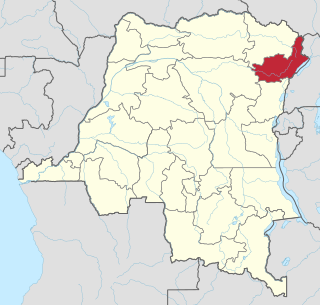
The Hema people or Bahema (plural) are an ethnic group of Nilotic origin who are concentrated in parts of Ituri Province in the eastern Democratic Republic of the Congo.
Sanga may refer to:

The Banda people are an ethnic group of the Central African Republic. They are also found in the Democratic Republic of the Congo, Cameroon, and South Sudan. They were severely affected by slave raids of the 19th century and slave trading out of Africa. Under French colonial rule, most converted to Christianity but retained elements of their traditional religious systems and values.
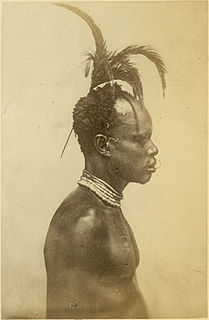
Avukaya is an ethnic group of South Sudan. Some members of this ethnic have fled to the Democratic Republic of the Congo due to persecution. About 50,000 members of this ethnic group live in South Sudan. Many members of this ethnic group belong to the Christian minority of South Sudan. The Avukaya traditionally live in a rain-forest area in Equatoria close to the Democratic Republic of Congo in Southern Sudan.
The Logo people or Logoa (plural) are an ethnic group of Nilotic origin who traditionally live in the north-east of the Democratic Republic of the Congo, western Uganda, and southern South Sudan. There are believed to be more than 200,000 people who identify as ethnically Logo of whom most live in the Congo's Faradje Territory, a remote region in Haut-Uélé Province, where they form the ethnic majority. Logo people also live in Watsa and Aba, both also in Haut-Uélé, and in Yei in South Sudan.
The Lungu people are a Bantu ethnic group living primarily on the southwestern shores of Lake Tanganyika, on the Marungu massif in eastern Democratic Republic of the Congo, and in southwestern Tanzania and northeastern Zambia. They speak dialects of the Mambwe-Lungu language, a Bantu language.

The Mongo people are a Bantu ethnic group who live in the equatorial forest of Central Africa. They are the second largest ethnic group in the Democratic Republic of Congo, highly influential in its north region. A diverse collection of sub-ethnic groups, they are mostly residents of a region north of the Kasai and the Sankuru Rivers, south of the main Congo River bend. Their highest presence is in the province of Équateur and the northern parts of the Bandundu Province.

The Republic of the Congo, also known as Congo-Brazzaville, the Congo Republic or simply either Congo or the Congo is a country located in the western coast of Central Africa. To the west lies Gabon; Cameroon to its northwest and the Central African Republic to its northeast; the Democratic Republic of the Congo to the southeast and the Angolan exclave of Cabinda to its south; and the Atlantic Ocean to its southwest. The official language is French.
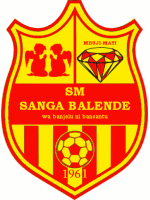
Sa Majesté Sanga Balende, is a football club that plays in the Democratic Republic of Congo top tier: Vodacom Ligue 1. Sanga Balende is the only club in vodacom Ligue 1, that is from Kasai Oriental, This gives them a lot of popularity around the DRC amongst the people of Kasai Districts. They have one of the biggest fan base around the country. The club is based in the city of Mbuji-Mayi.
Yipunu also known as Yisira is a Niger-Congo language spoken in the Republic of Gabon and the Republic of Congo by several thousand people, mainly of the Punu and Ghisir ethnic groups, the largest of the four major ethnic groups in Gabon. Yipunu has about 120 thousand native speakers, mainly from the southern Region, including 8 thousand speakers in southern French Congo. It is classified as B.43 in the Guthrie classification.
Sanga, or Luba-Sanga, is a Bantu language of the Democratic Republic of Congo. It is closely related to Luba-Katanga.
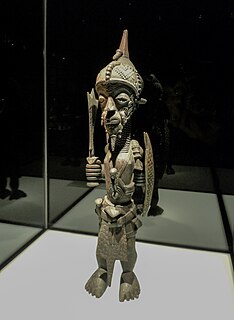
The Lulua people are a Bantu ethnic group settled along the Lulua River valley in south central Kasai-Occidental province, Democratic Republic of the Congo. The Lulua are in fact a collection of small groups whose home bordered by the larger Luba state and the related Songye people and Chokwe people, with whom they share a very similar culture, history, and language.
The Tumbwe people are an ethnic group living mostly in Tanganyika District of the Democratic Republic of the Congo.
The Sanga people are an ethnic group that lives mostly in the Katanga Province of the Democratic Republic of the Congo.
The Mpama are an ethnic group that today live in eastern Congo and western Democratic Republic of Congo, mainly along the Congo River. Because of their similarity to the Lia, Ntomba and Sengele, they are considered part of the Mongo ethnic group. They are river residents and lived traditionally from fishing, agriculture and trade in the Congo.
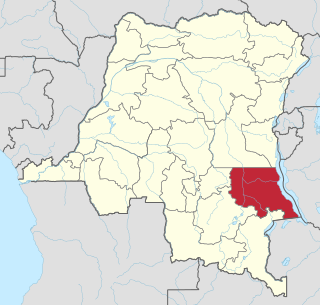
The Batwa–Luba clashes are a series of ongoing clashes in the Democratic Republic of the Congo (DRC) between the Pygmy Batwa people, and the Luba people starting in 2013.
References
| | This article about an ethnic group in Africa is a stub. You can help Wikipedia by expanding it. |